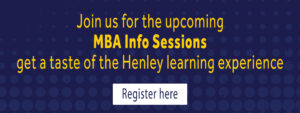Emerging markets need empathetic leadership, says Henley alumna
For Phillipine Mtikitiki, VP for Coca-Cola South Africa, an international Henley MBA consolidated earlier experiences of mentorship and coaching to convince her that leaders who are understanding and can see things from multiple perspectives are more likely to get the job done – especially in Africa.
________________________________________________________________________
Phillipine Mtikitiki will admit that in deciding on her first post-university job, her criteria were perhaps not the most rigorous.
As she was wrapping up her honours in economics at the University of KwaZulu-Natal in 1998, two work opportunities presented themselves. Although she had a litmus test – the job should allow her to travel the world – she was still undecided.
So she did her due diligence. She went to speak to a lecturer. It is a conversation that she still recalls today. The lecturer, she says, didn’t make any decisions for her. Instead, he gently helped Mtikitiki figure out what she wanted for her life, and make a choice based on that newfound understanding. And if the thing she wanted was international travel, she had to weigh up that consideration.
“It’s why today, still, the concept of coaching and mentorship is so important to me,” Mtikitiki says. “He didn’t tell me to do this or do that. As I was speaking to him, it just became clearer to me which job would be the most likely to deliver on my aspirations.”
A career journey worth the wait
Thus began her association with the Coca-Cola Company, the global brand she has served as vice-president of operations at the South Africa franchise since February 2021.
Not that the company would immediately realise Mtikitiki’s globetrotting dreams. In fact, it would take a good ten years before the opportunity for travel arose.
But it was a career journey – and international journeys – well worth the wait, she says. In one regard especially, it was a far cry from the training she had received as a university student.
“At the time, I had never attended a class on self-development or self-awareness or self-assessment or anything like that,” she says. “Now for the first time, during my training with the Coca-Cola company, I was asked to look at myself and say, this is me. This is how I do things. These are my blind spots.”
For the first few years, Mtikitiki worked for Coca-Cola franchises around South Africa. Operating as a sales manager and the like, she started off in Mpumalanga, working her way up the ranks to regional and country manager for sales and marketing, and eventually marketing operations manager at Coca-Cola Shanduka Beverages in Gauteng. Finally, in 2011, she would join to the mothership – Coca-Cola South Africa – as channel manager for traditional trade and wholesale.
Bridging the gap between the coalface and the boardroom
For the first time since working for the company and its affiliates, in this new role she felt out of her comfort zone. Her new colleagues loved the coalface perspectives she brought to the boardroom. But if previously her attentions had been very much focused on the nitty-gritty of operations, where success and failure were measured by the sales of that day, now she had to think bigger picture. She had to look days, weeks, even years ahead.
She wasn’t comfortable that she had that ability in her toolkit just yet. “I felt like I needed something to help me bridge that divide,” she says.
After speaking to a colleague who was doing an MBA at Henley Business School Africa, and weighing up other options, Mtikitiki too ‘headed’ to Henley. “Henley was everything I needed,” she says simply.
First off, knowing that Henley’s MBA was internationally accredited, she was assured that content would stand up to comparison – Henley Africa students are taught by the same faculty, marked and blind-assessed by the same examiners, and achieve the same international qualification as MBA students on Henley’s other campuses in the UK, Europe and Asia. She also found Henley Africa’s flexible and family-friendly curriculum model appealing. Not only had she just started a new job, but as a mother to two young children, including a one-year old, studying full-time in an old-school model was never going to work for her.
At Henley, deadlines and extensions can be negotiated when pressures get too intense, and the school provides free support workshops for students and their partners, with children’s entertainment provided on site at specific times to allow students to really focus on what they are learning.

A powerful approach to lead in Africa
Mtikitiki says that for her, among the elements that translated easily from the MBA classroom to boardroom were the lessons she learned about herself as a leader; most notably, what empathetic leadership really means.
“It’s not about me feeling sorry for someone, or letting them off the hook because they didn’t deliver on a deadline,” she says. “It’s more about understanding, from that person’s perspective, what it would take for them to get the job done. And contributing meaningfully to help them do that.”
That empathy and understanding is also priceless in adapting a global brand like Coca-Cola to an emerging market context, Mtikitiki believes. “Here you need leaders who can adapt, who can manage the complexity, uncertainty and volatility of our situation,” she says.
What’s more, a greater grasp of customers’ needs is required, and how to best respond to them, she adds. Here, perhaps more than other places around the world, an even greater customer-centred approach is needed.
“Because it is still a very poor continent and an emerging market, you have to think about how customer’s needs and requirements are still evolving, how you’re going to add value, how you’re going to support communities,” she notes. “Even when you’re recruiting staff, people want to know that the organisation is contributing to solving some of the challenges we have on the continent.”
ENDS